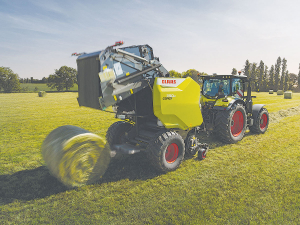With the biennial Agritechnica Event just a few months away, manufacturers are offering sneak peaks at new innovations, with Claas recently highlighting its new Cerex 700 RC round baler.
Said to complement and offer greater output and density above the existing Variant 500 Series, the new Cerex also offers maximum versatility in silage, straw, hay and hemp.
Up front, a 1,000 rpm PTO input, combines with a 5-row HD Multiflow pick-up and spiral feed rotor, said to be capable of producing up to sixty high-density bales per hour. At the heart of the new series, a new variable bale chamber concept with separate hydraulic system, features two endless Heavy-Duty belts and door clamps, to achieve bale densities of over 135 kg/m³ in straw.
Claas suggests that using two wider, rather than multiple narrower belts, makes the bale forming chamber dimensionally stable and due to the almost complete enclosure of the bale, means losses are significantly reduced even in short crops. The Cerex 760 RC offers bale diameters from 0.90 to 1.60 metres, or 0.90 to 1.83 m from the larger Cerex780 RC, while a soft-core function is standard to enable targeted core pressure when baling hay and silage.
The Multi-Flow HD pick-up offers a working width of 2.10 m, with five tine bars rotating at 146 rpm, allowing high forward speeds and a constant flow to the chopping rotor. The innovative cam track, carried across from the existing Rollant 630RC, offers stability with a 70mm central support shaft, while removeable, durable plastic stripper bands allow easy access for maintenance work.
Rearwards of the pick-up, the proven heavy-duty Roto-Cut feed rotor uses 8 mm thick, spirally arranged double tines made of doublehardened boron steel. Four rows of tines feed the crop at up to 13,800 cuts per minute through the 25-blade cutting rotor, achieving a theoretical chop lengths of 44 or 63 mm. Knife groups can be switched to 25, 13, 12 or zero, vis electro-hydraulic control. In the event of irregular lumps or foreign objects, the knife frame can open by up to 30mm to adapt to crop flow. Should a blockage occur, the cutting frame can be actively lowered hydraulically at the touch of a button on the ISOBUS terminal.
The Cerex 700 RC utilises a new wrapping system, with a so-called “duckbill” that ensures that the net can be inserted quickly and precisely thanks to its pre-positioning, saving time when changing rolls, as there is no need for any threading. A hydraulic net brake ensures optimum net tension, saving up to 15 per cent material. Net storage allows three rolls to be stored on the machine during use.
Read More:
ISOBUS operation of the new Cerex 700 RC is via the familiar, clearly laid out Cemis 700 terminal with a 7-inch colour display with touch function, ten direct access buttons and a rotary pushbutton in the programme. Alternatively, the round baler can be operated via other suitable ISOBUS terminals.
Promoting maximum operating comfort, sees work lights, an unobstructed view of the pick-up, integrated camera for bale monitoring, even in the dark, alongside a moisture sensor for crop condition and a sensor on the bale ramp to ensure vit is safe to close the tailgate.

















